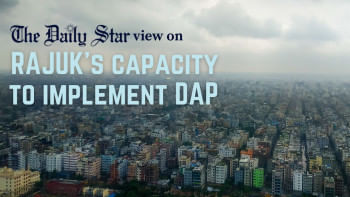Rajuk must fast-track its Jhilmil housing project

How many years does it take to finish four years? You'd think you know the answer, but for RAJUK, an organisation that lives in perpetual slo-mo, four years is not even enough to mark the start of four years. Or that's what it seems from the progress of RAJUK's Jhilmil housing project. According to a report by The Daily Star, five years have gone by since the capital's development authority took up the Tk-9,978-crore project in 2017. It was supposed to be completed in four years, but the project authorities could not even start the construction work yet, leading to a bid to sign a new deal and extend the deadline.
RAJUK is no stranger to such botch-ups in its housing projects and services. Inefficiency, corruption and mismanagement by its officials as well as systemic challenges frequently come in the way of citizens getting their money's worth from this vital institution.
Reportedly, the project was taken up under a public-private partnership (PPP) arrangement to build 85 high-rise buildings in Keraniganj, including 13,720 flats. The design also includes lake, park, playground, school, college, hospital, mosque, market, and community spaces. For such a mega scheme to work, there is no alternative to sound planning and execution, which has been missing in this project from the very start. Officially, the delay has been attributed to Covid-induced lockdowns and attendant complications. This may be one reason, but it cannot be the only one given the spotty history of public projects. As well as frequent revisions in the project design and other setbacks, questions have been apparently raised by several RAJUK insiders about the selection of the Malaysia-based BNG Global Holdings, the project's private partner and financier.
One particular change in design is the cancellation of the Fakirapool-Chunkutia flyover project – despite positive feedback from two Buet expert teams – which would have eased communication for the residents travelling to central Dhaka. This is just one example of how residents of such housing schemes of Rajuk often have to make do with substandard and insufficient living facilities despite rosy pictures drawn of them initially. The challenge for now, however, is to get the Jhilmil project off the ground. We're told that it may take five to six more months to sign a new deal, in yet another indication of RAJUK's slo-mo operation. No doubt the project's direct and indirect costs will have far exceeded the original budget by then, which means additional burden on the shoulders of taxpayers. Who is going to answer for that?
RAJUK is no stranger to such botch-ups in its housing projects and services. Inefficiency, corruption and mismanagement by its officials as well as systemic challenges frequently come in the way of citizens getting their money's worth from this vital institution. This cannot be how the central housing authority of a fast-expanding, fast-populating capital city is run. We urge the authorities to fast-track the Jhilmil housing project to meet the growing need for residence, and to learn from the problems encountered so that those cannot slow its progress after the new deal is signed.

 For all latest news, follow The Daily Star's Google News channel.
For all latest news, follow The Daily Star's Google News channel. 







Comments